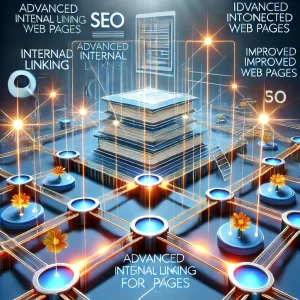Introduction
SEO is constantly evolving, and what worked last year may not cut it in 2025. Search engines are getting smarter, and competition is fiercer than ever. To stay ahead, you need innovative tactics. Here are 10 untapped SEO strategies that’ll give you an edge and help you rank higher on Google.
AI-Powered Content Optimization
AI is reshaping SEO. Google’s algorithms favor high-quality, well-structured content, and AI can help you refine your content to meet those standards. Using AI-driven insights, you can optimize for better keyword usage, readability, and engagement—without stuffing your article with unnecessary fluff.
Leveraging AI Tools for Content Refinement
AI-powered tools like Surfer SEO, Clearscope, and ChatGPT analyze top-ranking content and suggest improvements. They help optimize keyword placement, readability, and user intent alignment. Rather than writing blindly, AI gives data-backed recommendations that enhance your content’s search potential.
Balancing AI Content with Human Touch
AI-generated content may sound robotic, and search engines can detect inauthentic writing. Blend AI assistance with human creativity. Add personal experiences, humor, and storytelling to make content engaging. A mix of machine efficiency and human emotion creates articles that rank and resonate with readers.
Semantic SEO & Topical Authority
Google now prioritizes expertise over keywords. Instead of stuffing articles with terms, focus on covering a topic comprehensively. Creating authoritative content hubs signals Google that you’re a go-to source, boosting rankings.
Building Topic Clusters Instead of Keywords
Instead of standalone blog posts, organize content into topic clusters. A “pillar page” should cover a broad subject, with internal links to detailed subtopics. This structure helps search engines understand your expertise, increasing your chances of ranking for multiple keywords.
Internal Linking Strategies for Better Relevance
Internal linking isn’t just for navigation—it strengthens content relationships. Link related posts naturally, ensuring pages don’t sit in isolation. Avoid over-optimization; use natural anchor texts that flow with the content. Strategic linking improves indexability and user engagement.
Google’s EEAT (Experience, Expertise, Authoritativeness, Trustworthiness) Enhancement
Google’s EEAT guidelines are more important than ever. If your content lacks credibility, it won’t rank—no matter how well-optimized it is. Showcasing real-world experience and expertise builds trust with Google and your audience.
Showcasing Expertise and Authoritativeness
Add author bylines with credentials. Link to authoritative sources. Write case studies and detailed guides. Google values content backed by experience—so don’t just share theories, show proof!
Building Trust Signals for SEO Success
Trust is everything online. Google favors websites with real reviews, secure HTTPS, and brand mentions across the web. Get user-generated content, testimonials, and industry mentions to boost trust signals.
Zero-Click Search Optimization (Featured Snippets & People Also Ask)
Google is increasingly answering user queries directly in search results. If your content isn’t optimized for zero-click searches, you’re missing out on massive traffic potential.
How to Get Featured Snippets
Use bullet points, tables, and concise summaries to improve your chances of landing in featured snippets. Answer questions directly in the first 100 words of your content, then elaborate further down the page.
Optimizing for “People Also Ask”
Google’s “People Also Ask” (PAA) section is a goldmine for traffic. Identify common queries in your niche and create content answering them concisely. Structuring answers in a Q&A format increases your visibility.

Video SEO & YouTube Optimization
Video content isn’t just popular—it dominates search results. With Google prioritizing multimedia content, optimizing videos is a must.
How Video Content Dominates SERPs
Google often ranks videos above traditional blog posts. By embedding videos, you improve dwell time and engagement. Optimize video descriptions, titles, and tags with relevant keywords to enhance discoverability.
Best Practices for YouTube SEO
Use compelling thumbnails, keyword-rich descriptions, and engaging introductions. Add captions and timestamps for accessibility. Cross-promote on social media to increase views and improve rankings.
Google Discover & Web Stories
Google Discover is an AI-driven content feed that delivers personalized articles. It’s a major traffic source if optimized correctly.
How to Get Featured in Google Discover
Create visually engaging, mobile-friendly content. Use large images, clear headlines, and engaging storytelling. Google favors fresh, high-quality content, so keep updating posts with new insights.
Using Web Stories for Better Reach
Google Web Stories are bite-sized, interactive slides that drive engagement. They appear in search and Discover, providing an easy way to attract traffic. Optimize Web Stories with relevant keywords and strong visuals.
UX & Core Web Vitals Optimization
Google prioritizes user experience. Slow-loading pages, poor mobile design, and intrusive pop-ups can tank rankings.
Why Page Experience Matters
A fast, smooth website keeps visitors engaged. Google considers Core Web Vitals—loading speed, interactivity, and visual stability—as ranking factors. Optimizing these improves rankings and reduces bounce rates.
Mobile-First Indexing & Responsive Design
Google indexes mobile versions first. Ensure your site is responsive, images are optimized, and text is easy to read on smaller screens. A mobile-friendly design is non-negotiable.
Advanced Internal Linking for SEO Boost
Internal linking is one of the most overlooked SEO strategies. It strengthens your site structure and helps search engines crawl your content efficiently.
Silo Structure for Better Indexing
Group related pages into silos. This means linking only within relevant categories to reinforce topical authority. A well-structured site improves rankings and user navigation.
Avoiding Orphan Pages and Dead Links
Orphan pages (pages without inbound links) don’t rank well. Regularly audit your site to identify and fix dead-end links. Ensure every page is part of a structured linking system.
AI-Driven Personalized Search & Local SEO
Google tailors search results based on user behavior. To stay ahead, your SEO strategy must adapt to personalization trends.
Personalization in Search Rankings
Google analyzes search history, location, and user preferences to deliver personalized results. Creating dynamic content that adapts to different audiences increases visibility.
Hyper-Local SEO Strategies
For local businesses, optimizing for “near me” searches is critical. Use location-based keywords, optimize Google My Business, and encourage customer reviews to rank higher in local searches.
Leveraging Alternative Search Platforms (TikTok, Reddit, and Pinterest SEO)
Google isn’t the only search engine that matters. Platforms like TikTok, Reddit, and Pinterest drive massive traffic.
Optimizing for TikTok and Short-Form Content
TikTok SEO is real. Use keyword-rich captions, trending hashtags, and engaging visuals to boost discoverability. Engaging content ranks higher, so prioritize high-quality, informative videos.
Reddit & Pinterest for Niche SEO Growth
Reddit discussions rank on Google, making them an SEO goldmine. Participate in niche forums with valuable insights and backlinks. Pinterest, with its evergreen search capability, is another overlooked SEO tool—optimize pins with keyword-rich descriptions and high-quality visuals.
Conclusion
SEO in 2025 demands creativity and adaptability. By leveraging AI, video content, UX improvements, and alternative platforms, you can outshine the competition. Experiment, analyze results, and refine your strategy to stay ahead. Want to dominate search rankings? Start implementing these untapped SEO strategies today! 🚀


